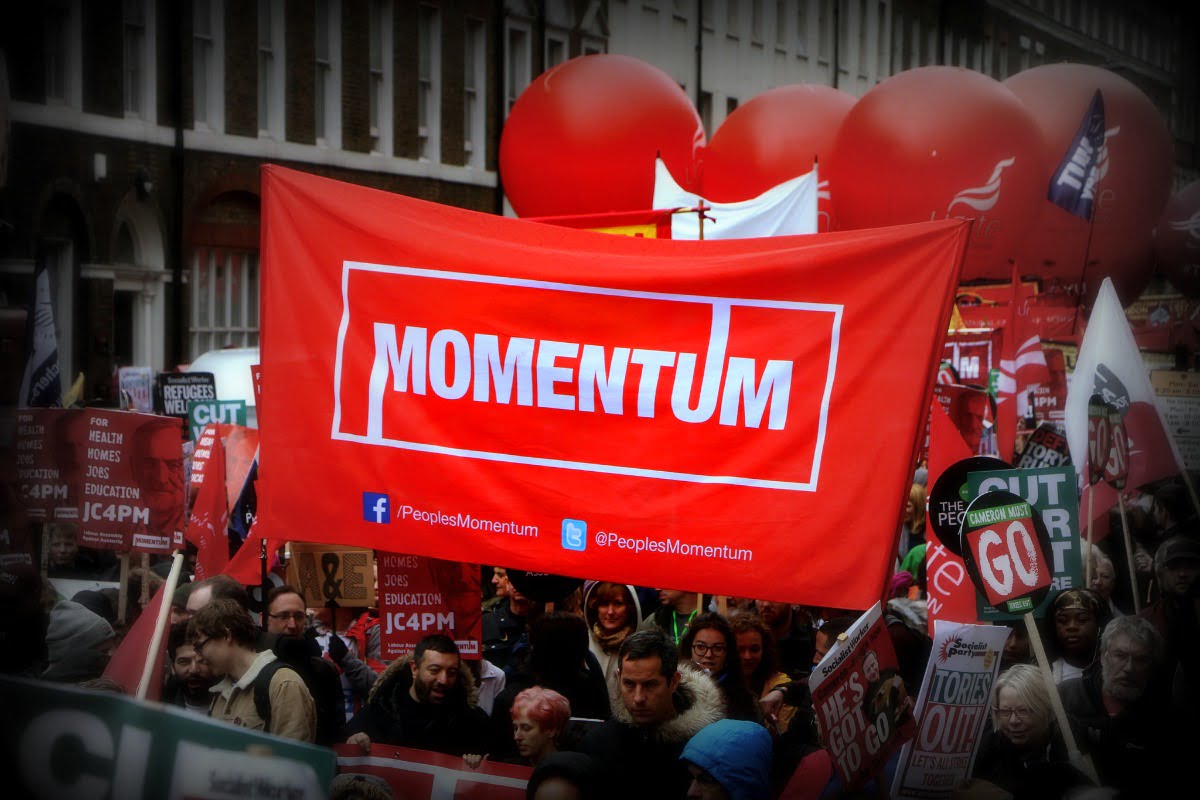Last Friday, the deep fissures between the left and right within Momentum spilled out into the open. The future direction for the Corbyn movement, therefore, now hangs in the balance. It is vital, above all, to draw out the political questions behind these tensions that have now come to the fore.
Last Friday, the deep fissures between the left and right within Momentum spilled out into the open. The future direction for the Corbyn movement, therefore, now hangs in the balance. It is vital, above all, to draw out the political questions behind these tensions that have now come to the fore.
It is no accident that the cracks burst open over the question of calling a democratic national conference to once and for all give Momentum the legitimacy it needs. This is because Momentum, like the Labour Party itself, represents a compromise.
On the one hand, Momentum is an attempt to harness the energy, determination and conviction of tens of thousands of left-wing activists to support Corbyn and his anti-austerity programme. On the other hand, those who founded Momentum – and currently lead it – are terrified of the radical potential and socialist implications such a movement has.
The Momentum leadership – around the central figure of Jon Lansman – has therefore, from the start, delayed giving the rank-and-file membership and local groups any real control over the organisation for as long as possible. But this impossible situation of the disenfranchisement of Momentum activists could only ever have lasted indefinitely.
With only 19 hours notice Lansman called an emergency Steering Committee meeting in order to postpone the already very delayed National Committee (to which the Steering Committee is accountable) meeting that was to formalise arrangements for the upcoming founding conference. The short notice of this meeting forced left-wingers Jackie Walker and Matt Wrack, who opposed the leadership’s proposals, to miss this meeting, making it all the more easy for Lansman to push through his plans.
It quickly became apparent the real reason for this ‘emergency’ meeting was to drastically alter the plans for the conference – which only the National Committee has the right to do – to transform it into effectively an ‘online’ conference. The conference would still take place, but without delegate structures (with discussions presumably taking place between whoever could turn up). In turn, the conference itself would take no decisions; instead these would be taken by online voting from Momentum members sitting at their computers over an unspecified period of time.
What are the political motivations and implications?
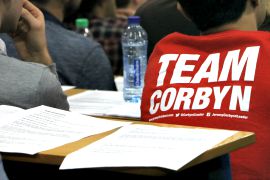 The justification for this sudden, drastic change is – of course – that it is more democratic, open, and ‘21st Century’. Superficially this may appear to be true; a delegate conference naturally restricts voting to those elected as delegates (though all members of course can participate in electing their delegates), whereas online voting gives each and every member a direct say.
The justification for this sudden, drastic change is – of course – that it is more democratic, open, and ‘21st Century’. Superficially this may appear to be true; a delegate conference naturally restricts voting to those elected as delegates (though all members of course can participate in electing their delegates), whereas online voting gives each and every member a direct say.
In reality ‘one member one vote’ (OMOV) has significant disadvantages and weaknesses in comparison to delegate systems, especially for working class, socialist organisations. It is not an accident that this system is preferred by a leadership who in reality wish to keep their membership passive and atomised, for that is exactly the advantage of OMOV, and of online activism in general.
Lansman’s justification for this system is very telling of his outlook and plans for Momentum, as are the arguments of his defender and left-cover, Paul Mason. Besides praising the system as very modern and open, Lansman argues that this system is necessary to bypass the local structures of Momentum (who would elect the delegates if it were a delegate conference), because he has decided that they lack legitimacy, being controlled by cliques of “hard-left” activists.
One might counter that Lansman declaring hundreds of local groups en masse to be just irresponsible cliques is itself rather irresponsible, cliquish and represents a very undemocratic attitude. It is precisely these local groups who have put the work into building Momentum and into transforming Labour at a local level, which is of paramount importance. That Lansman derides this work demonstrates his desire for Momentum to be a passive army for electing (and re-electing) Corbyn and little more.
If the local groups of Momentum do lack legitimacy in the eyes of its membership, that merely reflects a general problem with the organisation that stems from the leadership itself. Members of Momentum typically have a very rudimentary grasp of how the organisation works. They do not know who its leaders are, what its programme is and how they can influence it. Quite frankly, as this episode shows, its leadership does not understand its own structures and politics! Indeed, the National Committee, composed of members elected from local regions and liberation groups, has not met for more than six months, and the Steering Committee elected by the former has now seemingly dissolved this body it is accountable to!
The many sides of democracy
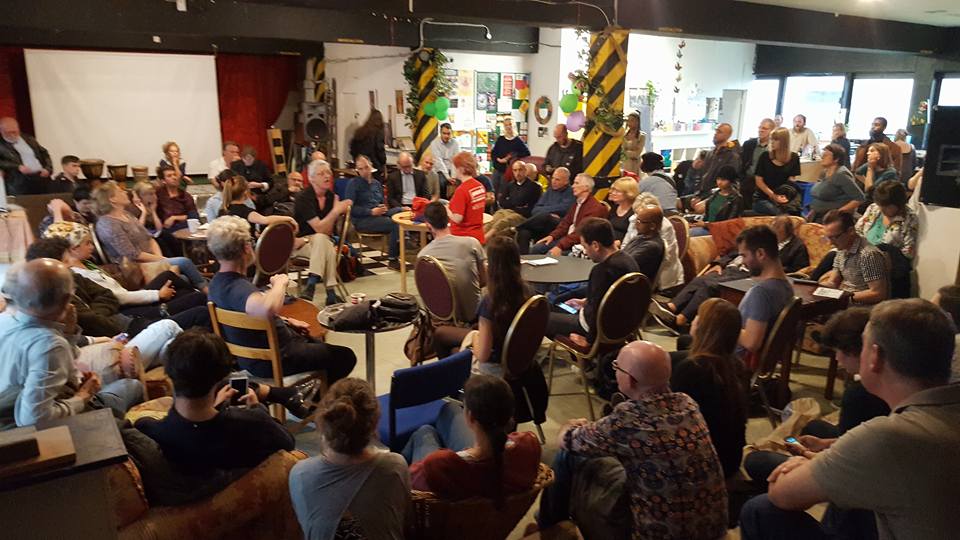 The advantage of a delegate system, if used properly, is that it builds clear structures and accountability. It allows for local groups to organise themselves, since they are obliged to call meetings and discuss politics in order to elect their delegates. The essence of working class democracy is participatory, practical and direct – the emphasis must always be on meeting up, discussing and educating each other through debate. Creating local leaders, accountable to the local group, is hugely important in strengthening the rank and file’s control, it trains activists at all levels and creates points of reference for members.
The advantage of a delegate system, if used properly, is that it builds clear structures and accountability. It allows for local groups to organise themselves, since they are obliged to call meetings and discuss politics in order to elect their delegates. The essence of working class democracy is participatory, practical and direct – the emphasis must always be on meeting up, discussing and educating each other through debate. Creating local leaders, accountable to the local group, is hugely important in strengthening the rank and file’s control, it trains activists at all levels and creates points of reference for members.
The methods of bourgeois democracy, by contrast, stress the rights of the atomised individual who is presented with a few different options as fait accomplis, which they then passively lend support to. It is clear that an online conference built on these lines will achieve the same ends – a passive membership distant from their leaders.
The ideal of online democracy is very good; the reality is very different. Podemos in Spain practices a similar “trendy” and “modern” method of online voting; the result is – again – a dominant leadership and a passive, atomised membership. This graph indicates how participation in Podemos’ online voting has continually declined, quite dramatically, as time has passed:
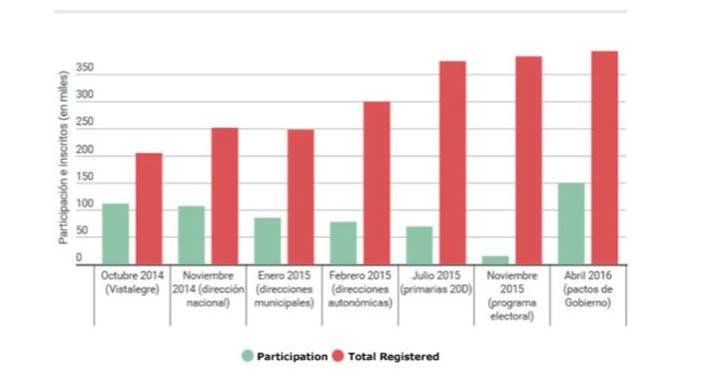
Paul Mason has echoed many of Lansman’s arguments in favour of online democracy, and has added some interesting and very telling comments. In his article on Medium, he writes that his vision for the modern social movement he wants Momentum to become is a loose ‘network’ of groups without discipline. He even says that its local groups should be free to ‘do as they please’, leaving it to chance whether they choose to prioritise taking over the local Labour Party or engaging in direct action type activism to save libraries, etc. And yet in the very next paragraph he says that for all internal Labour elections Momentum should put up a slate. But who is to decide this slate, and on what political programme should it run? How do we hold it to account, and how do we even find capable, articulate and responsible Momentum candidates to run for key Labour positions?
If each local group simply does as it pleases, and if Momentum conferences and democratic structures are practically non-existent, replaced by online voting, then how on earth is it to train and select representative candidates for transforming Labour?
The fight to complete the Corbyn revolution
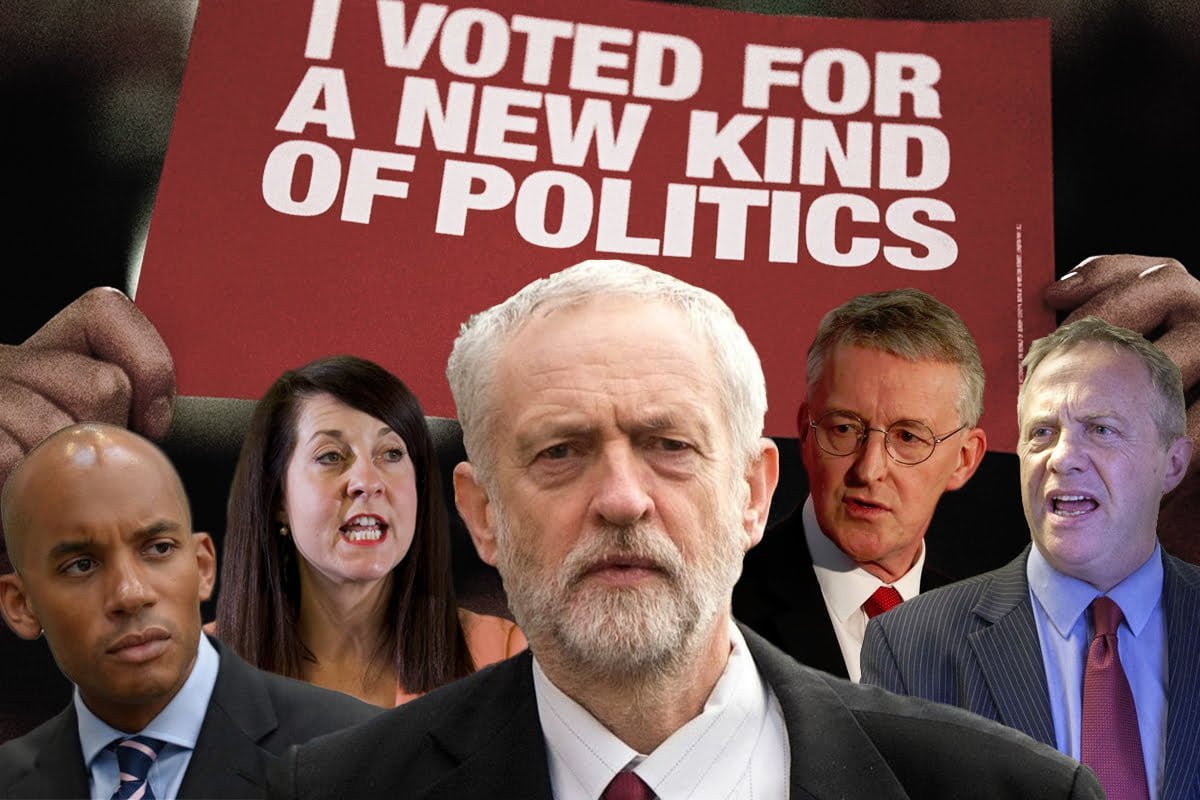 Transforming Labour – and completing the revolution in the Party that Corbyn’s election began – is no mean feat, and should not be taken lightly. The Momentum leadership’s disorganised, flippant attitude to such questions contributed greatly to the Blairites effective winning of the recent Labour conference, which passed a great deal of right wing policy as a result. The Labour right wing did so because they were organised and determined; they had the foresight to select candidates up and down the country to nominate themselves in the CLPs as delegates to conference; and this strategy was a success in acting to (semi-)neutralise Corbyn’s leadership.
Transforming Labour – and completing the revolution in the Party that Corbyn’s election began – is no mean feat, and should not be taken lightly. The Momentum leadership’s disorganised, flippant attitude to such questions contributed greatly to the Blairites effective winning of the recent Labour conference, which passed a great deal of right wing policy as a result. The Labour right wing did so because they were organised and determined; they had the foresight to select candidates up and down the country to nominate themselves in the CLPs as delegates to conference; and this strategy was a success in acting to (semi-)neutralise Corbyn’s leadership.
Unless this approach finds a democratic and left-wing mirror in Momentum, which clearly has the numbers to swamp the Blairites, Labour’s structures will remain right-wing.
The truth is that Lansman and co. fear giving real power to the local groups to get organised and elect delegates to determine conference policy, etc. because they fear the politics of the local groups and its activists. Lansman’s slur that these groups are full of irresponsible ultra-lefts, and Mason’s palpable fear of their disciplined focus, reveal more than they let on. They fear that should the real activists get to know each other and gain a voice, they will demand that Momentum take up policies like the reselection of Labour MPs, fighting the purge of socialists from the Party, setting anti-cuts council budgets, and other more militant, socialists ideas.
Lansman and co., like the reformist leaders in general, live in fear that their own base will upset their peaceful existence and their plans to present themselves as respectable. They fear the inevitable clash with the Blairites in Labour – a clash that the Blairites relish, knowing they have the full backing of big business and the media. It is this fear of breaking with the current status quo of compromise, militantly taking on the Blairite right wing, and transforming the Labour Party into a genuine fighting socialist movement that lies behind this fudging by the present Momentum leadership.
Just this morning, Momentum publically released a statement apologising for this farce and backtracking on their plans to cancel the National Committee and a delegate conference. However, the position is a classic fudge – the conference will be delegate based, but also with online voting afterwards.
This is a step forwards for the left. But we cannot fudge or confuse these matters. The internal structures of Momentum – which allow the rank and file to be organised and hold the leaders to account – must not be liquidated or undermined but strengthened.
Above all, Momentum needs to commit to clear socialist policies and a fighting campaign to transform the Labour Party at every level and complete the Corbyn revolution from top to bottom.

